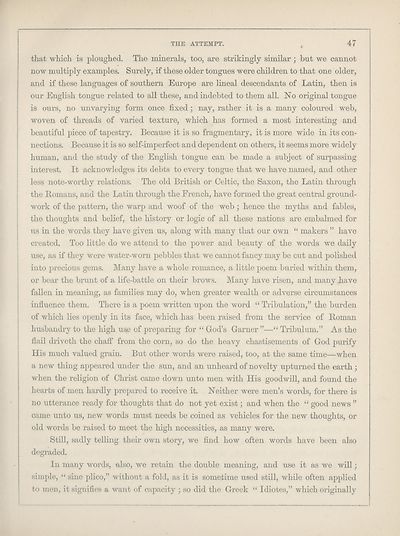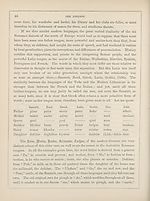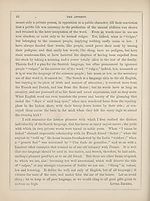Download files
Complete book:
Individual page:
Thumbnail gallery: Grid view | List view

THE ATTEMPT. . 47
that which is ploughed. The minerals, too, are strikiiigly similar; but we cannot
now multiply examples. Surely, if these older tongues were children to that one older,
and if these languages of southern Eiu-ope are lineal descendants of Latin, then is
our English tongue related to all these, and indebted to them all. No original tongue
is ours, no unvarying form once fixed; nay, rather it is a many coloured web,
woven of threads of varied texture, which has formed a most interesting and
beautiful piece of tapestry. Because it is so fragmentary, it is more wide in its con¬
nections. Because it is so self-imperfect and dependent on others, it seems more widely
human, and the study of the English tongue can be made a subject of surpassing
interest. It acknowledges its debts to evexy tongue that we have named, and other
less note-worthy relations. The old British or Celtic, the Saxon, the Latin through
the Romans, and the Latin through the Fi-ench, have formed the gi'eat central gx'ound-
work of the pattei-n, the warp and woof of the web ; hence the myths and fables,
the thoughts and belief, the histoiy or logic of all these nations are embalmed for
us in the words they have given us, along with many that our own " makex-s " have
ci-eated. Too little do we attend to the power and beauty of the words we daily
use, as if they were watex'-worn pebbles that we cannot faxxcy may be cut and polished
into precious gems. Many have a whole x-omaxice, a little poem buxied within them,
or bear the brunt of a life-battle on tlxeii- brows. Maixy have risen, and many Jxave
fallen in meaning, as families may do, when greater wealth or adverse circumstances
influence them. There is a poem written upon the word " Tribulation," the bui'den
of which lies opexxly in its face, which has been x'aised from the service of Romaix
hixsbandxy to the high xxse of px-eparing for " God's Garner"—" Tribvxlxim." As the
flail dx'iveth the chaflT from the cox-n, so do the heavy chastisements of God purify
His much valued grain. But other wox-ds were x-aised, too, at the same time—when
a new thing appeared uxider the sun, and an unheard of novelty upturned the earth ;
when the religion of Christ came down unto mexx with His goodwill, and found the
heax-ts of men hardly prepared to receive it. Neither were men's words, for there is
no utterance ready for thoughts that do not yet exist; and when the " good news "
came unto us, new words must needs be coined as vehicles for the ixew thoughts, or
old words be raised to meet the high xxecessities, as many were.
Still, sadly telling their ovm story, we fixxd how often words have been also
degraded.
In many words, filso, we retain the double meaning, and use it as we will;
simple, " sine plico," without a fold, as it is sometime used still, while often applied
to men, it signifies a want of capacity ; so did the Greek " Idiotes," which originally
that which is ploughed. The minerals, too, are strikiiigly similar; but we cannot
now multiply examples. Surely, if these older tongues were children to that one older,
and if these languages of southern Eiu-ope are lineal descendants of Latin, then is
our English tongue related to all these, and indebted to them all. No original tongue
is ours, no unvarying form once fixed; nay, rather it is a many coloured web,
woven of threads of varied texture, which has formed a most interesting and
beautiful piece of tapestry. Because it is so fragmentary, it is more wide in its con¬
nections. Because it is so self-imperfect and dependent on others, it seems more widely
human, and the study of the English tongue can be made a subject of surpassing
interest. It acknowledges its debts to evexy tongue that we have named, and other
less note-worthy relations. The old British or Celtic, the Saxon, the Latin through
the Romans, and the Latin through the Fi-ench, have formed the gi'eat central gx'ound-
work of the pattei-n, the warp and woof of the web ; hence the myths and fables,
the thoughts and belief, the histoiy or logic of all these nations are embalmed for
us in the words they have given us, along with many that our own " makex-s " have
ci-eated. Too little do we attend to the power and beauty of the words we daily
use, as if they were watex'-worn pebbles that we cannot faxxcy may be cut and polished
into precious gems. Many have a whole x-omaxice, a little poem buxied within them,
or bear the brunt of a life-battle on tlxeii- brows. Maixy have risen, and many Jxave
fallen in meaning, as families may do, when greater wealth or adverse circumstances
influence them. There is a poem written upon the word " Tribulation," the bui'den
of which lies opexxly in its face, which has been x'aised from the service of Romaix
hixsbandxy to the high xxse of px-eparing for " God's Garner"—" Tribvxlxim." As the
flail dx'iveth the chaflT from the cox-n, so do the heavy chastisements of God purify
His much valued grain. But other wox-ds were x-aised, too, at the same time—when
a new thing appeared uxider the sun, and an unheard of novelty upturned the earth ;
when the religion of Christ came down unto mexx with His goodwill, and found the
heax-ts of men hardly prepared to receive it. Neither were men's words, for there is
no utterance ready for thoughts that do not yet exist; and when the " good news "
came unto us, new words must needs be coined as vehicles for the ixew thoughts, or
old words be raised to meet the high xxecessities, as many were.
Still, sadly telling their ovm story, we fixxd how often words have been also
degraded.
In many words, filso, we retain the double meaning, and use it as we will;
simple, " sine plico," without a fold, as it is sometime used still, while often applied
to men, it signifies a want of capacity ; so did the Greek " Idiotes," which originally
Set display mode to: Large image | Transcription
Images and transcriptions on this page, including medium image downloads, may be used under the Creative Commons Attribution 4.0 International Licence unless otherwise stated. ![]()
| Ladies' Edinburgh Debating Society publications > Attempt > Volume 3 > (61) Page 47 |
|---|
| Permanent URL | https://digital.nls.uk/104343964 |
|---|
| Attribution and copyright: |
|
|---|

